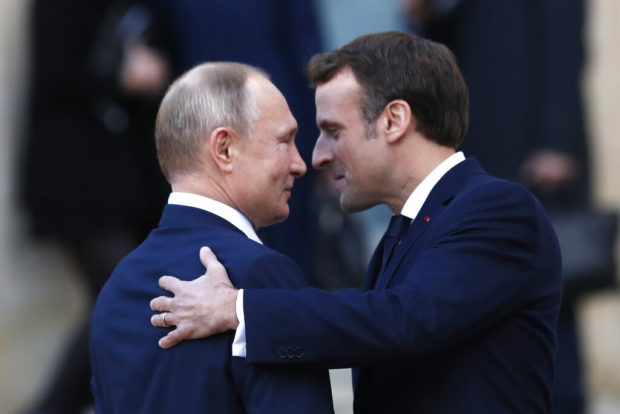
French President Emmanuel Macron with Russian President Vladimir Putin (AP File Photo)
PARIS — French President Emmanuel Macron says he hopes that “in the coming days” the five permanent members of the U.N. Security Council can discuss and endorse U.N. Secretary-General Antonio Guterres’ call for a ceasefire to all conflicts in the world in order to tackle the coronavirus pandemic.
Macron, who has been pushing for more international cooperation in fighting the virus, said in an interview with French radio RFI broadcast on Wednesday that he is only waiting for agreement from Russian President Vladimir Putin to hold the 5-country video conference.
China’s “President Xi Jinping confirmed to me he agrees. (U.S.) President (Donald) Trump confirmed to me he agrees. (British) Prime Minister Boris Johnson confirmed to me he agrees,” Macron said. “I think President Putin will agree too.”
“When he does, we can have this video conference and therefore endorse it (Guterres’ call) with great solemnity, strength, and even more efficiency,” the French president said.
Russia’s Foreign Minister Sergey Lavrov said Tuesday, when asked about a videoconference of the so-called P-5 leaders, “we do not rule it out.” He stressed that a video conference cannot substitute for an in-person summit of the five leaders, whose countries have veto-power in the 15-member Security Council.
“There is an agreement of principle for this event (an in-person summit) to focus on a large-scale, major analysis of global developments in all areas that one way or another bear on people’s safety and strategic stability,” Lavrov told reporters during a conference call.
Guterres said on April 3 that warring parties in 11 countries had responded positively to his March 23 appeal — Cameroon, the Central African Republic, Colombia, Libya, Myanmar, the Philippines, South Sudan, Sudan, Syria, Ukraine and Yemen have also expressed their acceptance. But he warned that turning words into peace will be enormously difficult.
The U.N. Security Council has been stymied on adopting a resolution on the COVID-19 pandemic and the secretary-general’s call for a cease-fire to all conflicts because of differences among the five permanent members — the United States, Russia, China, Britain and France.
Diplomats said the Security Council was initially blocked from issuing a statement or adopting a resolution by U.S. insistence that the origin of the virus in China or Wuhan be included, which China objected to, but the Trump administration relented on that and is now insisting on a reference to “transparency.” According to diplomats, another holdup was Macron’s desire to hold a P-5 summit meeting before a full Security Council meeting was held or a resolution adopted.
But the 10 elected Security Council members had been pressing for a council meeting and briefing from Guterres — and they had the nine votes needed for it to finally happen last Thursday. They have also drafted a resolution, as has France, but diplomats said talks have not yet started on trying to unite the rival drafts.
At Thursday’s closed council meeting, secretary-general Guterres warned that the coronavirus pandemic is threatening international peace and security and said this can potentially lead “to an increase in social unrest and violence that would greatly undermine our ability to fight the disease.”
He urged the Security Council, whose mandate is to preserve international peace and security, to unite on tackling the virus.
U.N. spokesman Stephane Dujarric said Wednesday that the U.N. is “very pleased” with the impact and resonance Guterres’ call has had “and a united and strong message from the Security Council would go a long way in pushing that call further and making it a reality.”